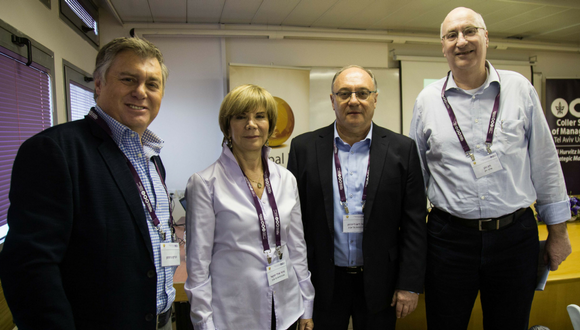The Global Up Forum on the swings in the global arena and their influence on the economy
The Global Up Forum meeting of the Eli Hurvitz Institute for Strategic Management held on Tuesday evening, 6 February 2018 at Tel Aviv University’s Coller School of Management was attended by senior managers and business people and dealt with the swings in the global arena.
The meeting opened with a presentation by Prof. Orly Yeheskel, Associate Dean of the Coller School and Academic Director of the Global Up Forum, in which she noted that the meeting would examine the changes in the economic-financial and political areas, with the aim of clarifying whether they indicate a new world order. In her words: “The complexity of today’s world makes it necessary to understand and analyze global management by means of new theories.”
Prof. Leo Leiderman, of Tel Aviv University’s Eitan Berglas School of Economics and Chief Economic Adviser to Bank Hapoalim, moderated the panel composed of Nathan Hetz, CEO of Alony Hetz and a graduate of the Coller School, Henrique Cymerman, journalist, lecturer and foreign affairs expert, and Neil Corney, CEO of Citibank Israel.
The meeting took place in the midst of swings in the capital markets, with falls on the Tel Aviv Stock Exchange too, though the participants in the meeting updated those present with the news that the trade in Tel Aviv closed that day with an increase of about two percent. In the words of Prof. Leiderman: “The present state of the global economy, with good growth rates almost everywhere, large liquid flows and the central banks’ zero interest rates, and the absence of any real inflation, is an episode that does not appear in any economics textbook. In fact, we have to open a new chapter in the economics literature.”
According to Prof. Leiderman, the swings in the markets of the last week are more of a correction of relatively high stock indexes than a change in trend in the direction of ongoing falling prices. He added: “These swings are likely to deter the leading central banks from rapidly raising interest rates this year, and this in itself will have a stabilizing effect.”
Nathan Hetz said that in his opinion there is no need to write a new chapter in the textbooks on economics since the world is continuing to behave in accordance with the same rules, as we can see in the area of real estate investments in the world. He claims that “uncertainty is a given, so our policy from the outset has been to diversify our investments in a number of countries.” Hetz noted that the policy of Alony Hetz is to invest in profitable real estate in western countries only. Analyzing the firm’s performance, in retrospect it appears that over the last decade the Israeli market yielded the biggest profits.
In introducing the journalist Henrique Cymerman, Prof. Leiderman said that in principle he would be pleased to continue the discussion in Spanish. Prof. Leiderman was born in Argentina, while Cymerman was born in Portugal and also speaks five languages, but out of consideration for the audience it was decided to continue in Hebrew, of course.
Cymerman told the audience about his insights from meetings around the Arab world and Europe, and about the challenges facing Europe, which instead of pursuing a policy of unification shows signs of separation, like Britain’s exit from the European Union. In his opinion: “Brexit is viewed as the most complex divorce in history. After a marriage of 46 years with the European Union there are today 700 issues to be resolved before the separation can be made. Europe’s biggest challenges for the coming years are reducing the waves of immigration and refugees and containing the rise of Islam and terror.”
Neil Corney related to the changes in the world of global banking, saying that companies like Amazon, Apple and Uber have changed the perception of serving customers, and the banks also have to prepare themselves to respond to the needs of the customer for service in real time. And in this context, the great importance of startups applying developed fintech (financial technology) and the cooperation of the world of banking with fintech is the combination that will lead future banking. Corney noted that today’s databases are enormously valuable, but we need the tools and knowledge necessary to derive value from them for the customers.
Among those present at the meeting were Prof. Moshe Zviran, Dean of the Coller School, the industrialist Gad Proper and his wife Eti, Dr Ravit Cohen Meitar, Academic Director of the Hurvitz Institute, Shaul Gilad, Vice CEO of Aeronautics Ltd, Dalia Prashker, entrepreneur and co-founder of New Dimension Software Ltd, Shai On, CA Software Israel Ltd, Dan Catarivas, Director of the Division of Foreign Trade and International Relations at the Manufacturers’ Association of Israel, Nava Kazaz, Vice CEO for Human Resources at HP, Dr Shmuel Ben-Zvi, member of the Board of Directors, Bank Leumi.





